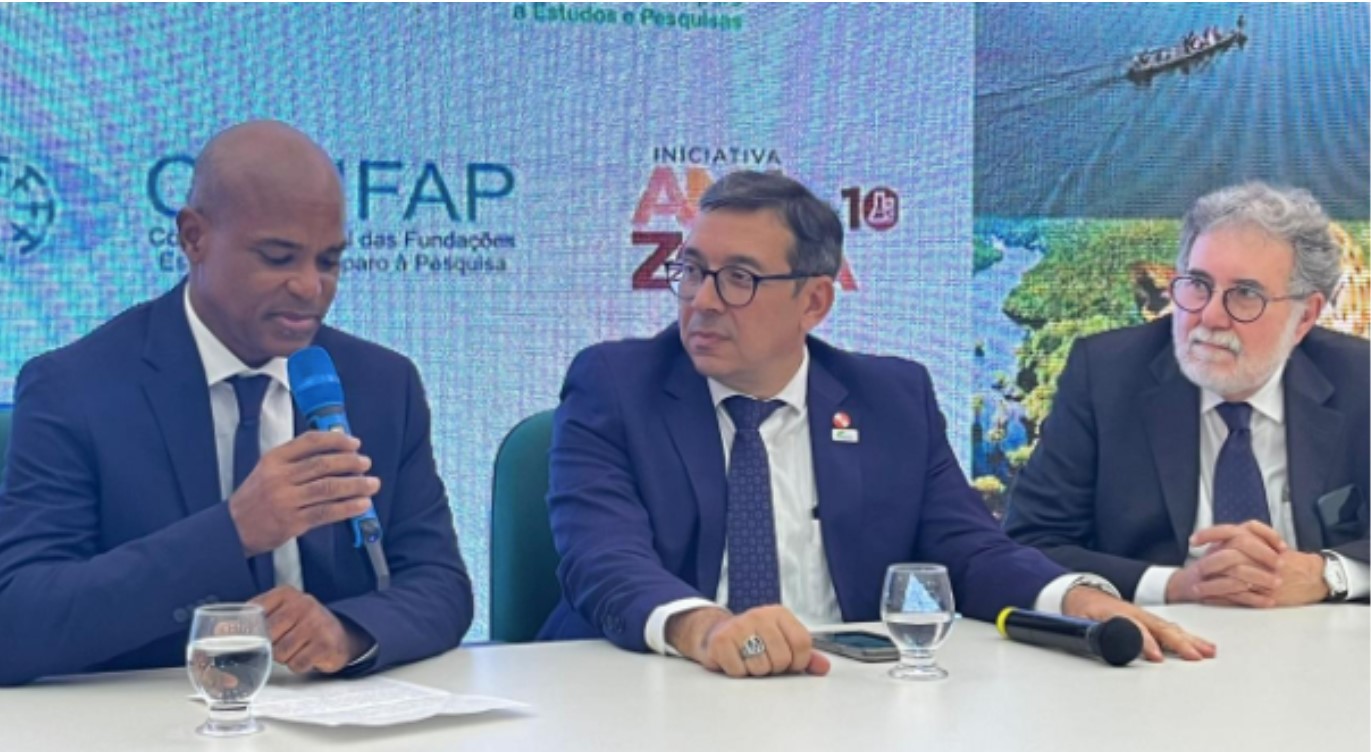

Laurent Linguet, Marcel Botelho and Carlos Américo Pacheco during the ceremony held to sign the agreement (photo: FAPESPA)
An agreement to this end was signed in Belém in the Brazilian Amazon during the visit of French President Emmanuel Macron and Laurent Linguet, President of the University of French Guiana. The aim is to foster international cooperation that furthers the development of the Amazon region.
An agreement to this end was signed in Belém in the Brazilian Amazon during the visit of French President Emmanuel Macron and Laurent Linguet, President of the University of French Guiana. The aim is to foster international cooperation that furthers the development of the Amazon region.

Laurent Linguet, Marcel Botelho and Carlos Américo Pacheco during the ceremony held to sign the agreement (photo: FAPESPA)
Agência FAPESP* – Brazil’s National Council of State Research Foundations (CONFAP) and the University of French Guiana (UG) signed a scientific cooperation agreement on March 26 in Belém, the capital of Pará state (Brazil), enabling UG to join the Amazon+10 Initiative. The aim is to foster international cooperation among researchers, scientific institutions and companies on projects that contribute to scientific and technological development and innovation in the Amazon region. The event took place during the visit by French President Emmanuel Macron and UG President Laurent Linguet to Belém.
The Amazon+10 Initiative is backed by research funding agencies (FAPs) in 25 Brazilian states and the National Council for Scientific and Technological Development (CNPq), an arm of the Ministry for Science, Technology and Innovation (MCTI). It has issued two calls for research projects worth a total of BRL 137 million. One of them is a joint call with the British Council, UK Research and Innovation (UKRI), the Swiss National Science Foundation (SNSF), and the Bavarian Academic Center for Latin America (BAYLAT) in Germany (read more at: agencia.fapesp.br/50783).
Linguet emphasized French Guiana’s interest in contributing to research on the Amazon. “The agreement will intensify collaboration among France, French Guiana and Brazil in an initiative that transcends borders, with the aim of conserving resources and improving the population’s living conditions,” he said. “The Amazon is more than a forest. It’s a symbol of our responsibility. Through this partnership, the University of French Guiana is reaffirming its commitment to protect and manage this environmental treasure by means of innovation, science and technology.”
The leading role played by the Amazon’s own institutions has changed the focus for research initiatives in the region, according to Marcel Botelho, President of the Amazonia Research Foundation (FAPESPA), Pará State’s science funding agency.
These partnerships have bolstered “our capacity to look below the forest canopy and see the cultural richness of the people who live here, as well as the acute need to produce new knowledge that can improve the quality of their lives while also promoting conservation,” he said.
Carlos Américo Pacheco, CEO of FAPESP, emphasized the importance of cross-border cooperation to research in and on the Amazon. “UG has invested in labs and studies in the areas of biology and innovation, and so this partnership gives all our scientists the opportunity to conduct high-quality research that will improve the lives of our populations,” he said.
Institutions represented by participants in the ceremony included the Brazilian Agricultural Research Corporation (EMBRAPA), the Amazon Development Agency (SUDAM), the Emílio Goeldi Museum of Pará (MPEG), the Pará State Department for Environment and Sustainability (SEAMS), the Federal University of Southern and Southeastern Pará (UNIFESSPA), the Federal University of Pará’s Amazon Biosolutions and Bioplastic Laboratory (LABA-UFPA), and Carlos Gomes Foundation. Researchers affiliated with UFPA, the State University of Pará (UEPA) and UNIFESSPA also took part.
Among the topics discussed at the meeting was the challenge of improving the quality of life for the region’s 29 million inhabitants by leveraging its potential for innovation and for producing and marketing biodiversity goods while making the bioeconomy a new economic matrix for sustainable development.
During a visit to FAPESP in December 2023, Linguet had already expressed an interest in collaboration with Brazil in research on the Amazon. French Guiana, an overseas département of France and hence part of the European Union, is almost entirely covered by tropical rainforest.
“I believe we can do a great deal together for our populations, for the forest, and for our countries. I see many common interests, especially in research on ecology, biodiversity, silviculture, and the impact of climate change on the Amazon,” he told Agência FAPESP on that occasion (read more at: agencia.fapesp.br/50696).
* With information from Lorena Coelho (FAPESPA).
Republish
The Agency FAPESP licenses news via Creative Commons (CC-BY-NC-ND) so that they can be republished free of charge and in a simple way by other digital or printed vehicles. Agência FAPESP must be credited as the source of the content being republished and the name of the reporter (if any) must be attributed. Using the HMTL button below allows compliance with these rules, detailed in Digital Republishing Policy FAPESP.





